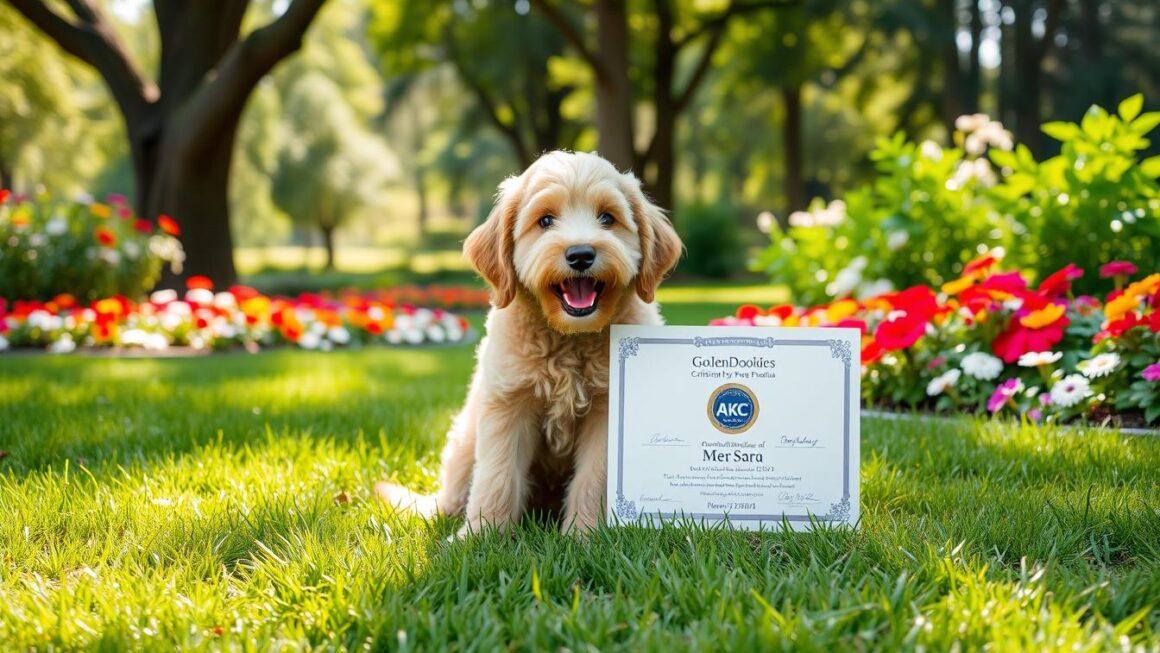Goldendoodles have quickly become one of the most beloved dog breeds in recent years. This friendly and affectionate crossbreed is a mix of a Golden Retriever and a Poodle, combining the intelligence and hypoallergenic qualities of the Poodle with the loyal, loving nature of the Golden Retriever. Sometimes called “teddy bear Goldendoodles” due to their cuddly appearance, they make wonderful family pets. But if you’re thinking about adding a Goldendoodle to your family, one of the most important questions is, “How long do Goldendoodles live?” Lifespan is a crucial factor when choosing a dog, and understanding what affects its life expectancy can help ensure your Goldendoodle stays happy and healthy for as long as possible.
What’s the Average Goldendoodle Lifespan?

On average, Goldendoodles live between 10 and 15 years. This range reflects the life expectancies of their parent breeds. Standard Poodles typically live between 12 and 15 years, while Golden Retrievers usually live around 10 to 12 years. By combining the genetic traits of these two breeds, Goldendoodle often have a lifespan that falls within this range, making them long-living companions.
However, the exact lifespan of any individual Goldendoodle dog can vary based on several factors. Genetics, diet, lifestyle, and medical care are crucial in determining how long a Goldendoodle will live.
Factors That Affect a Goldendoodle’s Life Expectancy
1. Genetics
Genetics are one of the most important factors that impact a Goldendoodle’s lifespan. Since Goldendoodles are crossbred, they can inherit health problems from both parent breeds. Golden Retrievers are known to be prone to certain health issues like cancer, hip dysplasia, and heart disease. On the other hand, Poodles are susceptible to conditions like epilepsy, eye problems, and skin allergies.
Because of this, it’s essential to research the health history of both parent breeds before purchasing or adopting a Goldendoodle. A responsible breeder will provide information on the health of the puppy’s lineage, ensuring that the risk of hereditary conditions is minimized.
2. Diet
The food you provide your Goldendoodle has a direct impact on their health and longevity. A balanced, high-quality diet is essential for keeping them healthy. Your Goldendoodle’s meals should include a mix of proteins, healthy fats, and carbohydrates, along with fruits and vegetables for essential vitamins and minerals.
Avoid giving them heavily processed foods or treats high in preservatives, as these can contribute to various health issues and shorten their lifespan. Instead, stick to premium dog foods or even consider home-cooked meals under the guidance of your veterinarian.
3. Lifestyle and Exercise
Goldendoodles are active, energetic dogs, so regular exercise is vital to their health. Daily walks, runs, or play sessions can help keep your Goldendoodle in shape and reduce the risk of obesity, which can lead to other health problems.
A Goldendoodle that gets plenty of exercise will live a longer life and be happier and healthier overall. Keeping them physically active reduces the risk of joint problems and heart disease later in life. Plus, it helps keep their minds sharp and reduces boredom, which can lead to behavioural issues.
4. Medical History
Your Goldendoodle’s medical history is key to its longevity. Regular vet visits are important, as they allow potential health issues to be detected early. Vaccinations, flea and tick prevention, and regular screenings are all crucial for preventing common health problems that can cut your dog’s life short.
Knowing your dog’s family medical history can help you proactively prevent certain conditions. Regular checkups and early treatment of any health concerns will give your Goldendoodle the best chance of living a long, healthy life.
5. Dental Health
Often overlooked, dental health is an important aspect of your Goldendoodle’s overall well-being. Gum disease and other dental issues can introduce harmful bacteria into the bloodstream, potentially leading to heart disease and other serious health problems.
Regular brushing and professional cleanings are essential for preventing gum disease and maintaining good dental hygiene. By keeping your dog’s teeth and gums healthy, you’re improving their quality of life and increasing their life expectancy.
6. Mental Exercise
Mental stimulation is just as important as physical exercise for your Goldendoodle. Boredom can lead to destructive behaviours and anxiety, which can negatively affect your dog’s health. Interactive toys, puzzles, and games can keep your Goldendoodle’s mind sharp and engaged.
Goldendoodles are highly intelligent dogs, so training sessions, agility courses, or even teaching them new tricks can be fun to keep them mentally stimulated. Providing them with plenty of mental challenges can help prevent boredom-related issues and contribute to a happier, longer life.
Training and Fitness: How They Increase Goldendoodle Lifespan
Like humans, Goldendoodles thrive when they live an active and healthy lifestyle. Ensuring your dog gets plenty of exercise and eats a balanced diet will greatly impact its lifespan. As the offspring of two athletic breeds, Goldendoodles need daily physical activity to stay fit and reduce the risk of obesity, joint problems, or other health issues.
If your Goldendoodle has access to a yard or an open space to run and play, they likely maintain a better level of physical fitness. For families with limited outdoor space, daily walks, trips to the park, or indoor games can provide enough exercise to keep them healthy.
In addition to physical fitness, proper training is also essential for your Goldendoodle’s well-being. This intelligent breed is eager to learn and can be trained early. Teaching them commands like “sit,” “stay,” and “leave it” can keep them safe, as well as improve their behaviour and socialization. Training also helps to reduce anxiety and stress, which can negatively affect their health over time.
Promoting Health Through Good Habits
- High-Quality Diet: Choose dog food with high protein and fat content to support your active lifestyle.
- Exercise: Provide daily opportunities for running, playing, and exploring.
- Vet Visits: Ensure regular checkups and early treatment for any emerging health issues.
- Mental Stimulation: Keep them mentally engaged with games, toys, and training.
- Dental Care: Brush their teeth regularly and schedule professional cleanings.
- Preventative Care: Watch for ear infections and other common breed-related issues.
Conclusion
Goldendoodles are wonderful pets that can bring many years of love, joy, and companionship. With an average lifespan of 10 to 15 years, they are long-living dogs that thrive with a healthy lifestyle, regular exercise, and proper medical care. Your Goldendoodle can live a long and happy life by keeping up with their health needs, providing mental stimulation, and offering lots of love and attention.
Whether you’re already a proud Goldendoodle owner or are considering bringing one into your family, understanding how to best care for them will ensure that they’re around to brighten your days for many years.
FAQs
What is the longest living Goldendoodle?
The longest-living Goldendoodles have been known to live up to 17 or 18 years, though this is rare. Longevity depends on factors like genetics, diet, exercise, and regular veterinary care.
Can Goldendoodles live to 20?
While it is uncommon, some small dog breeds have been known to live for 20 years. However, due to their medium to large size, it’s highly unusual for a Goldendoodle to reach this age. With exceptional care, some may live beyond the average lifespan of 10 to 15 years.
At what age do Goldendoodles slow down?
Goldendoodles typically begin to slow down around 7 to 10 years of age. This varies depending on their size and health, but you may notice less energy and a decreased desire for intense physical activity as they enter their senior years.
Is 7 old for a Goldendoodle?
At 7 years old, a goldendoodle is considered middle-aged. While they may start to show signs of aging, they are often still active and healthy at this stage with proper care. Regular vet check-ups, a good diet, and exercise are essential to keeping them in good shape as they age.




